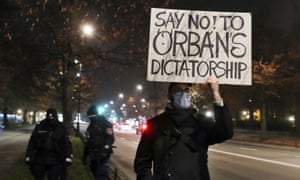As Poles and Hungarians, we urge the EU to stand firm on the rule of law | Máté Varga

As European leaders gather in Brussels this week municipal buildings and monuments in Warsaw and Budapest have been lit up in blue. The illuminations, organised by campaign groups and the mayors of these cities, are meant as a powerful reminder of the dark path ahead if the EU stands aside while the rule of law is extinguished in Poland and Hungary. The lights are a call for solidarity with the millions of citizens of both countries who argue that EU funding should be conditional on their governments upholding these fundamental rights.
The release of €1.8tn in EU funds for rebuilding after the pandemic and the EU’s 2021-2027 budget is at stake. So far agreement has been derailed by Hungary’s Viktor Orbán and Poland’s Mateusz Morawiecki because of their unwillingness to accept that membership of the EU depends on upholding democratic values.
This, of course, is not a new fight for these two leaders. For years now, we in Poland and Hungary have had to contend with our national governments undermining the fundamental values: democracy and human rights that underpin membership of the EU. Hundreds of thousands of us have taken to the streets, year after year, to fight their attempts to control our country’s media, judiciary, and democratic political systems.
The list of violations of rule of law, civil society, judicial independence, and press freedom in our countries is long. Famously, the Hungarian government has trampled on academic freedom by making it impossible for the Central European University in Budapest to operate – the first time a university has been forced into exile since the War. In Poland, the ruling Law and Justice (PiS) party took control of the formerly independent National Council of Judiciary – ensuring that appointment, promotion and disciplining of the nation’s judges was to be decided by party loyalists.
As I write, PKN Orlen, Poland’s state-run oil company, has just bought Polska Press, a private media outlet that reaches 11 million Poles every day. Critics are expressing concern, and they are right to do so, given the pattern of events in Orbán’s Hungary. Here, independent media outlets have fallen, one after another, into the hands of pro-government figures – to the extent that almost no independent, or critical government media, now exists in the country.
It is not an exaggeration to say that democracy is under threat in Poland and Hungary. In a major survey of citizens, last year, two-thirds of Poles (64%) indicated that they thought the rule of law was being undermined in their country. While, in Hungary, 58% of respondents felt that their political system was “broken”.
I still remember the celebrations in my home town when Hungary joined the European Union in 2004. To those that had grown up behind the iron curtain, it was a moment when we knew that we would be safe from tyranny and part of a collective with our European friends.
Through our membership of the EU, we have been able to undergo reforms that have solidified and strengthened the rule of law, guaranteed freedoms, and let us live and prosper as Europeans. And this is a position that is reflected, in survey after survey, with a recent round of polling finding that 73% of Poles and 65% of Hungarians believe membership of the EU has been good for the prosperity of their country.
At aHang in Hungary and Akcja Demokracja in Poland, we have been supporting hundreds of thousands of citizens in both countries who believe in a mechanism that links EU funding to the rule of law. We have received messages of support from people expressing such sentiments as: “being spirit and body in Europe was my dream of youth”; “Poland’s accession to the EU was a very special day for me”; and “the current actions of the Polish government are a crime against its citizens”.
These are sentiments that are widely held and which are being ignored by Orbán and Morawiecki.
EU leaders face a choice. They can appease Orbán and Morawiecki and let down the citizens of Hungary and Poland who are concerned about basic freedoms. This would embolden the two leaders and show other nationalist leaders that the tactics of blackmail can be effective. It would fuel a further shift to authoritarianism, not just in Hungary and Poland, but across Europe, and cause unnecessary fracturing of the EU27. An alternative would be to face down these “paper tigers” and stand with the citizens of these two countries for the defence of our values, as Europeans.
We, and hundreds of thousands of citizens from Hungary and Poland, urge them to stand firm against the bullying tactics of Orbán and Morawiecki, and to set an example of how Europe treats autocrats. There is no east and west divide among the populations of the EU27. We are as committed to democracy and rule of law, and have as much right as western Europeans to demand our leaders leave them intact. We need the support of the rest of the EU to defend the values we share.
• Máté Varga is the founder of aHang (theVoice), Hungary’s largest progressive campaign group, and the president of the Civil College Foundation
No comments:
Post a Comment